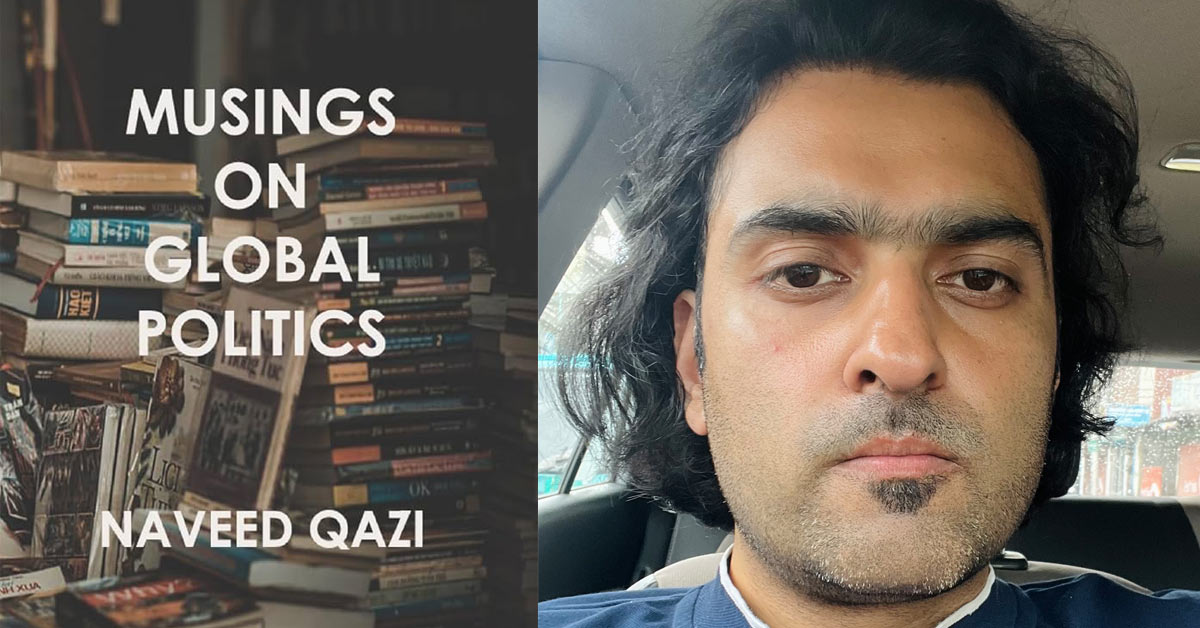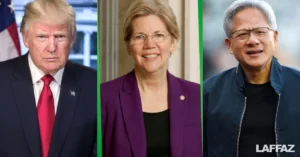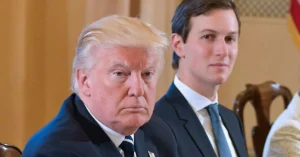It is an objective glimpse into world politics. Basically, the writer has done his best to truly make the book comprehensible to all kinds of readers.
- Title: Musings on Global Politics
- Author: Naveed Qazi
- Publisher: Createspace Independent Publishing Platform
- Publication date: 25th January, 2018
- Edition: Paperback
- Pages: 346
- Price: ₹ 950.00 (Amazon.in)
- ISBN-13: 978-1984209979
I’m not an avid reader but I do read from time-to-time, enough to pretend to be an “intellectual”. My reading list is filled with frivolous fictional literature, it is only in recent times that I explored the non-fiction genre, and I am glad that Musings on Global Politics was one of my first reads.
Before I begin my review, I’d like to give a brief about the book and the author, to give some context to those of you who are yet to read the book.
Synopsys
Keeping with its title, the book was just that – musings on global politics. It was a collection of essays (news articles) that covered not just the well-known aspects of Global Politics, but also dealt with the issues faced by lesser popular countries. It is very relevant and gives us an honest bird’s eye view into the Global scenario of recent times.
About the Author
Naveed Qazi was born and raised in Srinagar, India. He got nearly all his education in India but did go abroad for his Masters in International Business, which he pursued from the University of Hertfordshire, UK in the year 2012. He regularly contributes news articles and essays to local portals and newspapers. Other than “Musings on Global Politics” he is also the author of “The Trader of War Stories” a political thriller, and “Corporate Social Responsibility in UK Supermarket Industry”.
Writing Style
The primary reason I don’t pick non-fiction is because I feel a lot of it is created for a very niche audience. I was pleasantly surprised when I began reading Musings on Global Politics because I’m someone who is blatantly unaware of the politics of my own country, let alone that of other parts of the world.
Keeping in mind this embarrassing confession, I didn’t find the book difficult for someone like me to understand. It was not pompous and always provided a brief context. It was the right balance of formal and friendly and didn’t make use of superfluous fancy words, which I find characteristic of any writing related to politics. Each essay was also the right length and well-suited to the attention spans of the present generation of readers.
The chapters are standalone, so you can progress through it at random and still get the author’s intended message.
The title of each article was accompanied by a quote (which you encounter as you progress through the article), which gives you a vague idea as to what to expect in the chapter. It also gives the whole book a poetic feel.
It starts with minor issues (in terms of the number of people affected). Only in the last few chapters, a reader feels that the anthology deals with major issues like the unending Syrian War and the Arab Spring. This progression, I felt, is apt for a work like this, as none of these matters arose out of nowhere in the spur of the moment. They had a complicated history and were the result of numerous mishappenings occurring simultaneously, which I feel the author did a good job of highlighting without stating the same explicitly. It is left to the reader to connect the dots.
Having said the above, I do wish the book had a world map in it. I found myself dragging my cursor through Google Maps, many times, just to get a better idea of where a country was located, and how its geography had a bearing on its public affairs.
In the beginning of the book, you will also find a list of abbreviations and their full forms which you can refer to later, as you read. Basically, the writer has done his best to truly make the book comprehensible to all kinds of readers.
What I’ve Learnt?
China’s silent battle to establish itself as a superpower is very much on. Sometimes they do so by expanding their border and illegally occupying foreign lands (and even waters, as in the case of the South China Sea). Other times, they surreptitiously lend a helping hand to North Korea in its Nuclear Weaponry whilst maintaining cordial relations with the US.
I’d always think of the US as the Roman Empire of the present era, but calling it that is giving it too much credit. Naveed Qazi boldly quotes instances where it was the US that unashamedly instigated wars for its personal benefit. Not just this, the US somehow always manages to find a mention in the narrative of any country as it has sort of established itself as a dictator to the rest of the world, through the immense power it holds in the UN and other organisations of global significance.
In the articles, I also realised how much of a negative connotation there was behind the mere mention of the word – “Islam”. It’s also not completely unfair considering how Islamic states are known for their autocratic rule and violence (many times against their own people).
The refugee crisis is not just that of Syria, there are Palestinian refugees, Somalian refugees, Rohingyas, African migrants, and many more. These refugees have taken desperate measures to flee their homeland only to receive hostile treatment even upon finding asylum. Fortunately, some European countries (France, and Austria to name a few) have agreed to host refugees, unlike Saudi Arabia which deported 20,000 Somalis back to their warring homelands.
The author spoke about the politics in Bosnia and Darfur, both places where extreme violence and “ethnic cleansing” has taken place, both countries that were probably too insignificant for the media to sensationalise.
Other countries, such as Greece, Cambodia, Spain, and so on, may not have problems that are matters of life and death, nonetheless, they are plagued by political unrest all caused by, inequality, national debt, unemployment, dearth of resources and infrastructure, and pressure from other countries to either host refugees or to pledge allegiance and subservience in return of aid. These concerns if not dealt with at the earliest could result in something drastic.
There is a lot more learning imparted in those 346 pages. The author ends on a hopeful note saying – “We should increase the zeal for justice, no matter who does it, no matter who says it. If justice prevails that’s the biggest triumph.”
My Reading Experience
I love reading dystopias as I find them true to reality. Dystopias don’t sugarcoat to appease the readers. Reading Musings on Global Politics, at times, felt like reading a dystopia. It was honest and harsh.
“Who has been defeated? Who has attained glory in this clash of civilisation – is it the modern or is it the conservatives?”
Naveed Qazi did a good job of remaining fairly unbiased in his narration and brought out sentiments of each side in every article. Even the reader was left wondering who was the good guy and who we’re fighting against.
There is also a whole essay highlighting the importance of graffiti (basically any kind of art) at trying times like these. Art can stir a revolution and give a loud message without shouting. He talks of how Kashmiri graffiti pales in comparison to Egyptian, Yemen, and Libyan graffiti. Integrating other aspects of culture and Humanities with politics was both smart and necessary.
I also felt immensely privileged while reading as I came to realise that only a few 1000 kms away are war-ridden countries.
Even though it made me feel sad, I wanted to read on to better understand the kind of world we live in. To be a spectator of the equations and relations between countries and empires all run by megalomaniacs. I’ve always seen politics as men’s gossip, but now I have the relevance of it. They may not be matters that have any direct impact on us, but they teach us a lesson on peace, power, and pride, how the ego and sense of ownership of a few can lead to massacres of thousands if not millions.
We talk about war as if it is a mere thing of memory, but we don’t realise, that war is very relevant and rampant, we’re just too busy to look up from our smartphones to realise.
How to Read the Book?
To someone who is trying to build the habit of reading, it is not a very easy read. It would help if you brush up on your social studies and learn the meaning of words like Leftists, Communism, Marxist, Kleptocracy, and so on beforehand. While the author has simplified the content, some background knowledge is always helpful for quicker comprehension.
Although I liked the book, it did take me a while to complete it because it is like a collection of short stories. You don’t feel the pressure to continue reading as there isn’t a single plot tying the book together. You’re free to make your conclusions but they are all independent news articles.
Sticking to the book and finally completing it was well worth the effort, as it gave me a lot more knowledge and insight than my entire school’s Social Studies syllabus did. I also feel I could appreciate it more at this age and phase of my life, where such things seem relevant. The book was so good I’m actually following international news on a daily basis, as that is the closest to a sequel I can get.






very nice review. Can you write review on my book QUOTATIONS & STORIES”?
Hello Pranita! We would love to publish your content. Please tell us more here: https://laffaz.com/contact/
Good review, Misbah. I enjoyed it.
It is mentioned above the review while giving details of the book: “Pages: 286”. However, in the review itself it is mentioned: “There is a lot more learning imparted in those 346 pages.” Only one figure can be correct. Which one?
Please fix the following sentence “Even the reader was left wondering who was the good guy and who are we’re fighting against” to “Even the reader is left wondering as to who the good guy is and who we are fighting against.”
Thank you Mohsin for appreciating our work and pointing out the errors. We’ve fixed those ?
Thank you Laffaz team, especially Misbah for such an in-depth review.
Regards,
Naveed